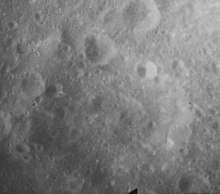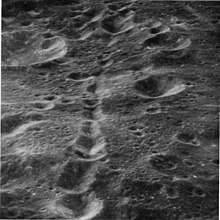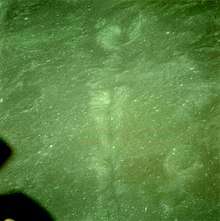Gregory (lunar crater)
Gregory is a lunar impact crater on the far side of the Moon. It is named after the 17th century Scottish astronomer and mathematician James Gregory.[1] It is located to the southeast of the crater Ibn Firnas, and north-northeast of Bečvář. About one crater diameter to the north is the smaller Morozov.
 Apollo 16 Mapping Camera image | |
| Coordinates | 2.2°N 127.2°E |
|---|---|
| Diameter | 64 km |
| Colongitude | 234° at sunrise |
| Eponym | James Gregory |


This is a worn and eroded crater formation. The northern rim is degraded due to impacts. Attached to the exterior of the southwest is Gregory Q, a satellite crater about the same size as Gregory. Within the interior is the remains of a small crater rim along the northwestern inner wall. To the east of Gregory and leading away to the southeast is a crater chain designated Catena Gregory.
Satellite craters
By convention these features are identified on lunar maps by placing the letter on the side of the crater midpoint that is closest to Gregory.
| Gregory | Latitude | Longitude | Diameter |
|---|---|---|---|
| K | 0.4° S | 128.5° E | 26 km |
| Q | 0.6° N | 125.7° E | 68 km |
References
- "Gregory (lunar crater)". Gazetteer of Planetary Nomenclature. USGS Astrogeology Research Program.
- Andersson, L. E.; Whitaker, E. A. (1982). NASA Catalogue of Lunar Nomenclature. NASA RP-1097.CS1 maint: ref=harv (link)
- Bussey, B.; Spudis, P. (2004). The Clementine Atlas of the Moon. New York: Cambridge University Press. ISBN 978-0-521-81528-4.CS1 maint: ref=harv (link)
- Cocks, Elijah E.; Cocks, Josiah C. (1995). Who's Who on the Moon: A Biographical Dictionary of Lunar Nomenclature. Tudor Publishers. ISBN 978-0-936389-27-1.CS1 maint: ref=harv (link)
- McDowell, Jonathan (July 15, 2007). "Lunar Nomenclature". Jonathan's Space Report. Retrieved 2007-10-24.CS1 maint: ref=harv (link)
- Menzel, D. H.; Minnaert, M.; Levin, B.; Dollfus, A.; Bell, B. (1971). "Report on Lunar Nomenclature by the Working Group of Commission 17 of the IAU". Space Science Reviews. 12 (2): 136–186. Bibcode:1971SSRv...12..136M. doi:10.1007/BF00171763.CS1 maint: ref=harv (link)
- Moore, Patrick (2001). On the Moon. Sterling Publishing Co. ISBN 978-0-304-35469-6.CS1 maint: ref=harv (link)
- Price, Fred W. (1988). The Moon Observer's Handbook. Cambridge University Press. ISBN 978-0-521-33500-3.CS1 maint: ref=harv (link)
- Rükl, Antonín (1990). Atlas of the Moon. Kalmbach Books. ISBN 978-0-913135-17-4.CS1 maint: ref=harv (link)
- Webb, Rev. T. W. (1962). Celestial Objects for Common Telescopes (6th revised ed.). Dover. ISBN 978-0-486-20917-3.CS1 maint: ref=harv (link)
- Whitaker, Ewen A. (1999). Mapping and Naming the Moon. Cambridge University Press. ISBN 978-0-521-62248-6.CS1 maint: ref=harv (link)
- Wlasuk, Peter T. (2000). Observing the Moon. Springer. ISBN 978-1-85233-193-1.CS1 maint: ref=harv (link)
External links
| Wikimedia Commons has media related to Gregory (lunar crater). |
| Wikimedia Commons has media related to Catena Gregory. |